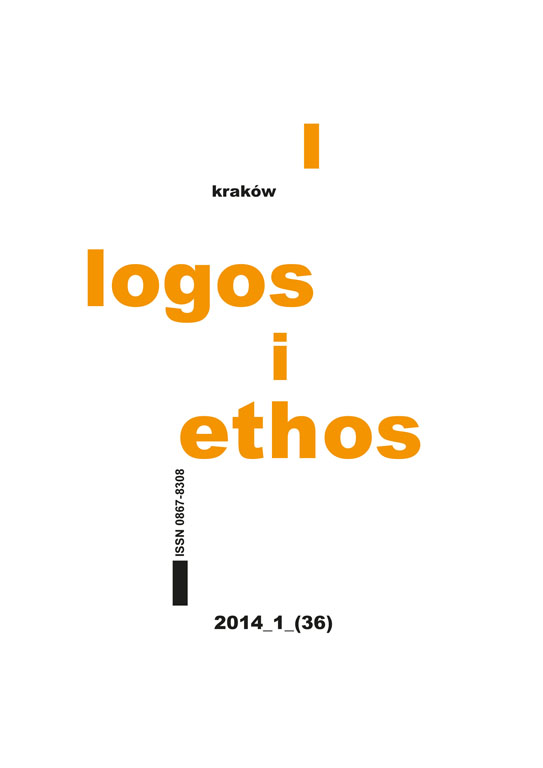Cielesność i dekonstrukcja chrześcijaństwa: Jean-Luc Nancy a Jacques Derrida
DOI:
https://doi.org/10.15633/lie.26Słowa kluczowe:
Jean-Luc Nancy, Jacques Derrida, deconstruction of Christianity, body, incarnation, resurrectionAbstrakt
This article aims to be a confrontation with Nancy’s “deconstruction of Christianity”. For Nancy to deconstruct Christianity means to point to the places where Christianity itself overflows its status as religion and as metaphysics. Nancy shows how the three Christian mysteries (Trinity, Incarnation, Resurrection) are not merely explainable metaphysically and how they thus open the thought of the new relation between body-mind. These theses have been criticized by Jacques Derrida reading of Nancy’s work in Le Toucher. Jean-Luc Nancy. Derrida turns his attention to a certain strand of the tradition which he calls “haptological” (from the Greek haptein, to touch). This tradition is implicated in the metaphysical gesture insofar as it thinks touch in terms of identity, homogeneity, immediacy and self-presence, even when it emphasizes a certain interruption or distance. According to Derrida, this is Nancy’s complicity with some form of metaphysical thinking. The conclusion of this article aims to expose the multidimensional discussion between philosophers.
Bibliografia
Alexandrova A., Devisch I., ten Kate L., van Rooden A. eds., Retreating Religion. Deconstructing Christianity with Jean-Luc Nancy, New York 2012.
Birnbaum A., To Exist is to exit the point, [w:] J.-L. Nancy, Corpus, tłum. R. A. Rand, New York 2008.
Derrida J., Le Toucher. Jean-Luc Nancy, Paris 2000.
Derrida J., Przemoc i metafizyka. Szkic na temat myśli Emanuela Lévinasa, tłum. K. Kłosiński, [w:] J. Derrida, Pismo i różnica, Warszawa 2004.
Esposito R., Flesh and Body in the Deconstruction of Christianity, „Minnesota Review”, 2010, no. 75, s. 89–99.
James I., The Fragmentary demand – an introduction to the philosophy of Jean-Luc Nancy, Stanford 2006.
ten Kate L., Intimate distance: rethinking the unthought God in Christianity. On Jean-Luc Nancy’s Deconstruction of Christianity, Compared and Confronted with the ‘Theological Turn in Phenomenology’, ,,Sophia”, 2008, vol. 47, issue 3, s. 327–343.
ten Kate L., Outside in, inside out: Notes on the Retreating God in Nancy’s Deconstruction of Christianity, ,,Bijdragen. International Journal in Philosophy and Theology”, 2008, vol. 69, no. 3, s. 305–320.
Kwietniewska M., Między strukturalizmem a derridianizmem, czyli artystyczne uwikłania francuskiej filozofii pisma, „Sztuka i Filozofia”, 1996, nr 11, s. 135–149.
Morin M.-E., Jean-Luc Nancy, London 2012.
Nancy J.-L., Corpus, tłum. M. Kwietniewska, Gdańsk 2002.
Nancy J.-L., L’Adoration (Déconstruction du christianisme, 2), Paris 2010.
Nancy J.-L., La déclosion (Déconstruction du christianisme, 1), Paris 2005.
Nancy J.-L., L’Extension de l’âme, Metz 2003.
Nancy J.-L., Noli me tangere, Paris 2003.
Nawrocki A., O projekcie Jean-Luc Nancy’ego „dekonstrukcji chrześcijaństwa”, „Kwartalnik Filozoficzny”, 2007, T. XXXV, s. 37–59.
Schrijvers J., What Comes after Christianity? Jean-Luc Nancy’s Deconstruction of Christianity, „Research in Phenomenology”, 2009, no. 39, s. 266–291.
Watkin Ch., Neither/Nor: Jean-Luc Nancy’s Deconstruction of Christianity, „Research in Phenomenology”, 2007, no. 37, s. 136–143.
Załuski T., Dystans w relacji: Jacques Derrida i Jean-Luc Nancy, [w:] Foucault, Deleuze, Derrida, red. B. Banasiak, K. M. Jaksander, A. Kucner, Toruń 2011.
Pobrania
Opublikowane
Numer
Dział
Licencja
Prawa autorskie (c) 2014 Błażej Baszczak

Utwór dostępny jest na licencji Creative Commons Uznanie autorstwa 4.0 Międzynarodowe.
Autorzy publikujący w czasopiśmie udzielają jego wydawcy zgody o następującej treści:
- Autor zachowuje autorskie prawa majątkowe do utworu, a jednocześnie udziela wydawcy czasopisma zgody na jego pierwszą publikację w wersji drukowanej i wersji online na licencji Creative Commons Uznanie autorstwa 4.0 Międzynarodowe oraz zgody na wykonywanie opracowań, w tym przekładów.
- Autor ma możliwość udzielania zgody niewyłącznej na opublikowanie utworu w wersji, która ukazała się w czasopiśmie (np. zamieszczenia go w repozytorium instytucjonalnym lub opublikowania w książce), wraz z informacją o jego pierwszej publikacji w czasopiśmie.
- Autor może umieścić swój utwór online (np. w repozytorium instytucjonalnym lub na swojej stronie internetowej) jeszcze przed zgłoszeniem utworu do czasopisma.

